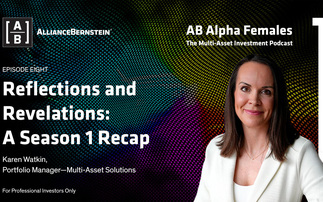Industry Voice: With recent global growth downgrades by the OECD and IMF coupled with the unwinding of supportive monetary policy, it is likely we will see higher levels of financial market volatility next year. Policymakers may have to intervene once again to get global growth back on track, whether through fiscal or monetary policy. But this is a tall order. Investors will need to remain highly discerning as we move into 2019.
On the fiscal side the US has led the way, however is now beginning to realise it must fund its tax cuts, while on the monetary side, the ECB and Federal Reserve are still unwinding the easy money that has supported markets for nearly a decade. The ECB must be hoping they haven't left it too late.
Political uncertainty is likely to remain a feature in 2019, with President Trump's unpredictability almost the only certain outcome for policy in the United States. In the run-up to the US midterms in November he was toying with the idea of further tax cuts, and announced he expects a "great deal" with China, but if no deal is reached he will impose more tariffs. In Europe, uncertainty is also likely to reign, with successful Brexit or Italian budget discussions unlikely to simply materialise.
The US could surprise us
There are possibilities of investors being surprised on either the upside or downside in 2019, and the risk of either a dramatic recovery or a further meaningful sell-off.
While not intuitively a positive for markets, a slowdown in the US economy may be welcomed warmly by markets outside of the US. Such a development could usher in a slowdown in the Fed's tightening cycle and result in lower US rates, a weaker US dollar, and perhaps even a lower oil price, which could all serve to alleviate the traditional headwinds for the rest of the world, especially the hardest hit emerging markets. A serious stimulus commitment out of China would also result in an upside surprise for investors.
In terms of downside risks, there is a danger that stubbornly high long rates suffocate risk appetite, and resilient corporate profits stumble creating a fall in asset prices. If the world's central banks continue tightening we could see even further weakness in interest rate sensitive sectors.
Political surprises could also impact markets negatively or positively, for example, the US President may be protectionist, or seek to burnish his "great dealmaker" credentials or even both simultaneously.
Capturing the best opportunities in 2019
As we are coming out of an extended period that rewarded investors for simply being exposed to markets, and volatility looks here to stay, we need to be much more selective in how we allocate in our portfolios in the year ahead.
In 2018 we made the contrarian call to reduce our exposure to the FANG (Facebook, Amazon, Netflix and Google) stocks and turn to value rather than growth oriented managers in the US. We believe this stance continues to be the appropriate one. In emerging markets, we see opportunities beginning to present themselves after a very rough 2018, however, we are focused here on value biased rather than growth oriented managers, and believe emerging market debt may offer as much potential as equities.
Currencies are another area where investors need to be selective, and we are looking at the Japanese Yen as a potential area of strength, especially given the potentially overvalued US dollar. Getting hedges right will also be a key driver of performance. In 2019 we think a healthy allocation to traditional hedges like gold will serve us well.
Find out more about Fidelity Multi Asset
Important information
The value of investments and the income from them can go down as well as up, so you may not get back what you invest. Past performance is not a reliable indicator of future returns. Investors should note that the views expressed may no longer be current and may have already been acted upon. Overseas investments will be affected by movements in currency exchange rates. The price of bonds is influenced by movements in interest rates, changes in the credit rating of bond issuers, and other factors such as inflation and market dynamics. In general, as interest rates rise the price of a bond will fall. The risk of default is based on the issuer's ability to make interest payments and to repay the loan at maturity. Default risk may, therefore, vary between different government issuers as well as between different corporate issuers. Liquidity is a measure of how easily an investment can be converted into cash. It is possible that, in difficult market conditions, it could be hard to sell holdings in corporate bond funds. Investments in emerging markets can be more volatile than other more developed markets. Reference to specific securities should not be construed as a recommendation to buy or sell these securities and is included for the purposes of illustration only. Investments should be made on the basis of the current prospectus, which is available along with the Key Investor Information Document, current annual and semi-annual reports free of charge from professionals.fidelity.co.uk or on request by calling 0800 368 1732. Issued by FIL Pensions Management and Financial Administration Services Limited, authorised and regulated by the Financial Conduct Authority. Fidelity, Fidelity International, the Fidelity International logo and F symbol are trademarks of FIL Limited.











